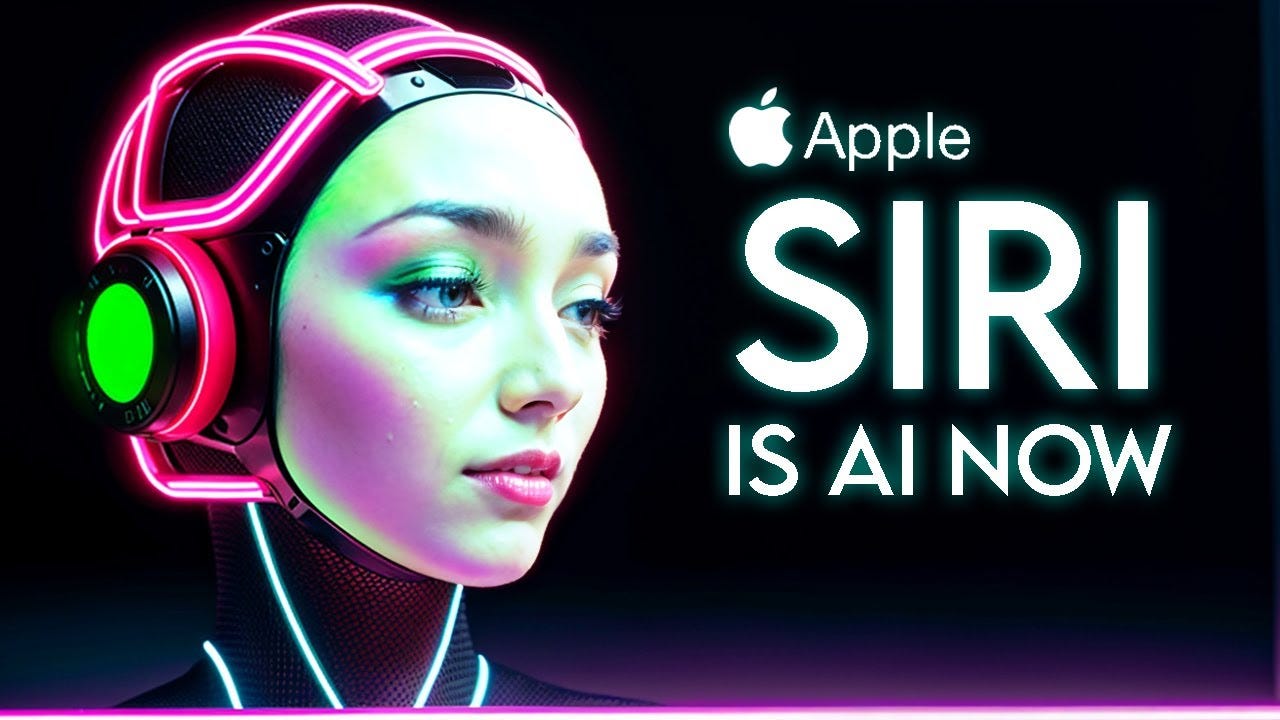Apple Intelligence turns our iPhones into best AI devices 📲
+ best features from WWDC
Recent WWDC brought us many exciting updates and even more memes about them. Let us see what all the fuss is about and discuss whether Apple Intelligence is as dangerous as Elon Musk is trying to prove on Twitter.
What we are going to cover:
How does Apple Intelligence work
Siri’s new skills
Integration with OpenAI
Privacy concerns
Other cool features from WWDC
Use cases
How does Apple Intelligence work?
As the developers shared during the presentation, Apple Intelligence is the personal intelligence system that uses powerful generative models, large language models and diffusion models to check whether your mom’s plane has already landed. AI can gather data from many apps on your device such as Notes, Messages and Contacts, identify it and then use it to answer your queries.
It is especially cool that you can just ask things as you would in real life because Siri understands natural language now. And if by chance your question requires research outside the data which was stored on your device it can call up the big brother ChatGPT. But only if you allow it, which generally complicates user experience, but is said to protect your privacy. We will talk about it later.
Keep your mailbox updated with practical knowledge & key news from the AI industry!
Will Siri finally do my dishes?
As expected, our good old friend Siri has gotten a major upgrade! Siri is now not only catching up with the competition but also setting the bar for smart assistance on mobile devices. Not only does Siri look much prettier now, but she also understands and communicates more naturally. Plus, guess what? Siri now writes too! You can choose to interact by voice or typing. Just give a double tap at the bottom of your iPhone or iPad to start the chat.
As we’ve mentioned above, Siri understands natural language better now and you can just ask “When can I meet John for lunch?” and she will understand who John is, check your schedule and can even suggest a place to have a nice meal.
Siri also supports you when writing emails or other texts. It uses the same tricks that we already know from other LLMs. So if you write a long text, you can have it summarized afterwards. You can adapt the language style so that it suits the recipient better. If you feel like it, you can simply have this text reworded again and again until you like it perfectly.
Siri can now open apps, edit photos, and explain every function on your device in detail if you wish. The new and improved Siri can even read context directly from your display. So, if you’re viewing a new address a contact sent you, simply say, "Save the address in the contact card," and Siri will take care of it.
Unfortunately, dishes and laundry are still too advanced for AI but here is to hoping.
Share this post with friends, especially those interested in AI Insights!
When the Big Brother comes to play
Ok, but what if I need to know something that is not on my device? Like whether that place we visited with John last year is still open? This is exactly the case where Siri will have to reach out to the Big Smart ChatGPT thanks to Open AI integration it got from Microsoft. (We were as surprised as you are, folks, but let us not dwell on it.)
But before contacting any other service Siri will politely ask you whether you want to share your data with a service outside the Apple ecosystem.
Apparently, everything you share with Siri is safe from Apple employees and even if the data is not completely handled on your device it is still protected. During the keynote words like Private Cloud Computing were uttered and those mean that Apple has its own servers to look up your information and delete all the data it might have used afterwards.
ChatGPT did not proclaim any such guarantees which is why you are constantly asked to consent to it receiving your data. However, Apple SVP of software engineering Craig Federighi mentioned that there was an arrangement between OpenAI and Apple that data from its users is not used for teaching models.
However, the keynote didn't give us a particularly thorough explanation of what runs locally on the device, what runs via Private Cloud Compute, what does ChatGPT handle, etc. So we still don't really know how it all ties in together, where the boundaries are. And how powerful Apple Intelligence actually is when you're running it device-only.
So what’s eating Elon Musk?
Open AI integration may have made many users concerned because Apple and Microsoft have always been Batman and Joker types of rivalries, but for the Space X builder, this was the last straw in a matter of privacy.
If Apple integrates OpenAI at the OS level, then Apple devices will e banned at my companies. Tht is an unacceptable security violation. And visitors will have to check their Apple devices at the door, where they will be stored in a Faraday cage.
from Elon Musk’s post on X
Shortly afterwards people commented that Musk should create his very own phone which will be secure and will create competition for Apple. The billionaire did not laugh at the thought but took it into action and hinted that X phone was on its way.
Further in the thread, computer science professor Matthew Green raised some concerns about Apple AI. Researchers won't see the source code running on servers, for example, which Green wrote is "a little suboptimal" when it comes to investigating how the software behaves. Importantly, users won't be able to choose when their device sends information to Apple's servers. "You won't opt into this, you won't necessarily even be told it's happening. It will just happen. Magically. I don't love that part," Green wrote.
Should we be worried? Yes and no. Apple shifted a lot of responsibility to the user when it decided to ask you each time you wanted to send a query to ChatGPT. And at the same time assured that if you do not have an account with it and just using the free version integrated with Siri, your data will be processed under Apple security protocols and therefore not accessible to anyone else. And PCC servers are built on Apple's chips and use Secure Enclave, an isolated system that handles things like encryption keys, among other in-house privacy tech.
Is that enough to protect your data? Well, that is entirely up to you. But we appreciate that Apple is at least trying to make AI more privacy-safe.







